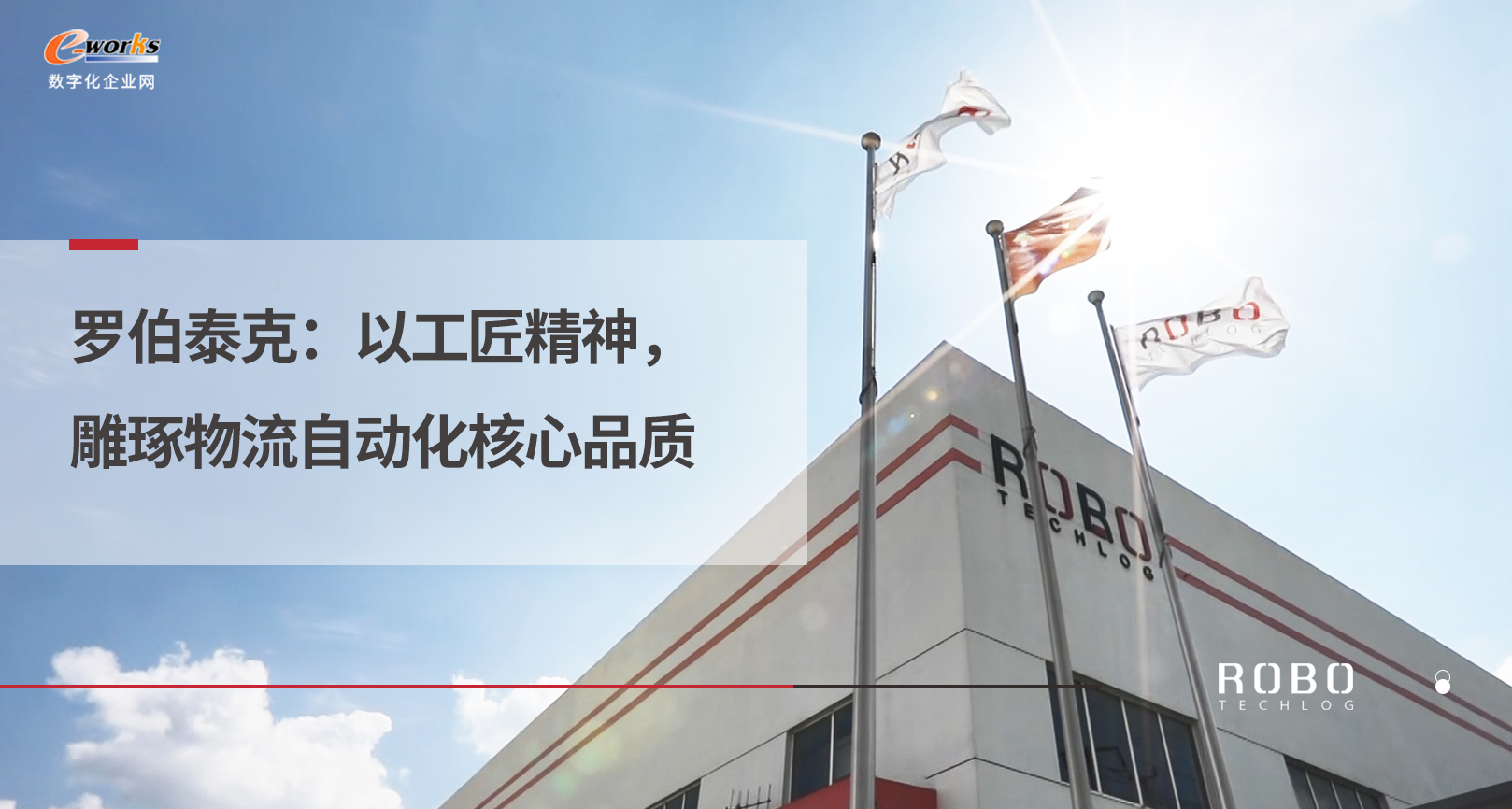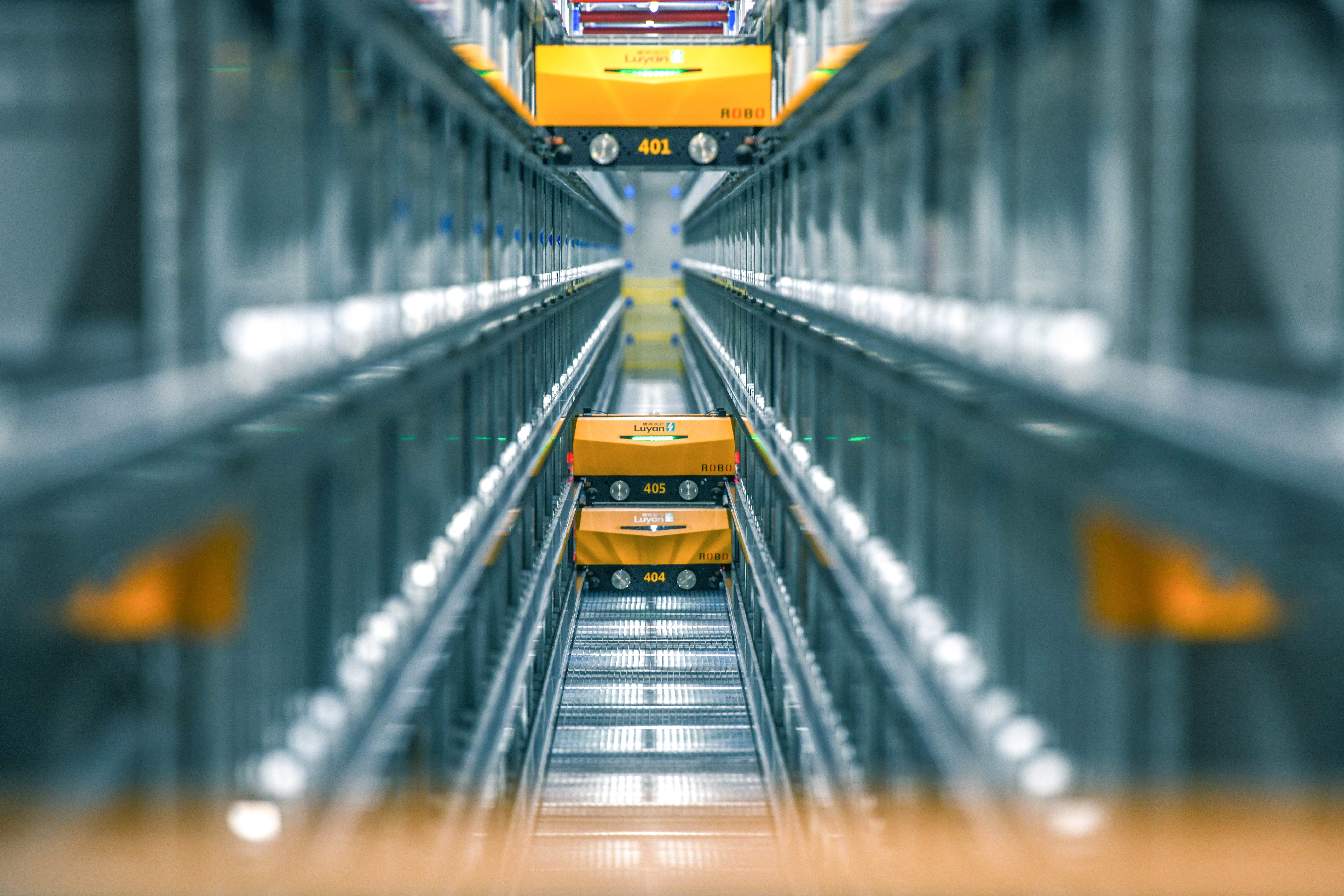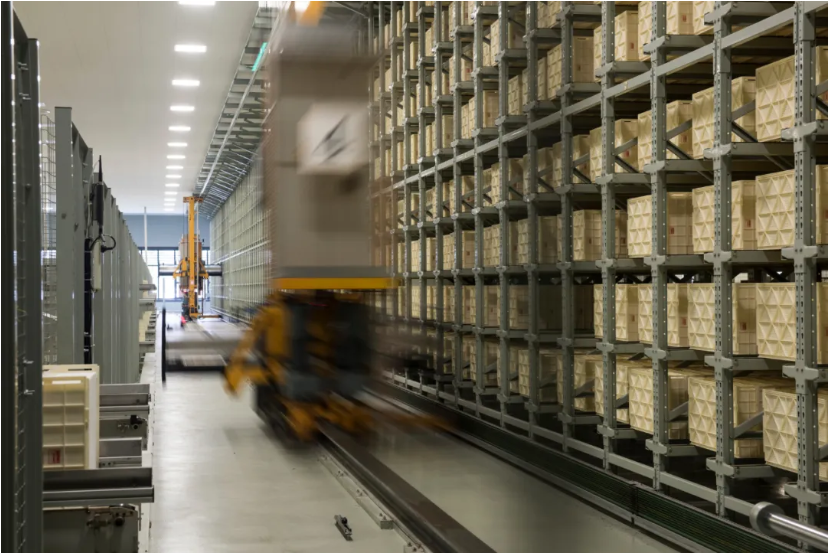ROBOTECH: Sculpt the core quality of logistics automation with craftsman spirit
Company News | 2021-06-07 10:24 Page views:
Introduction: Recently, ROBO Technologies Automation (Suzhou) Co., Ltd. was interviewed by e-works, a well-known domestic intelligent manufacturing digital media enterprise. Mr. Qu Dongchang, special assistant to the managing director, was interviewed on behalf of the company. In-depth analysis on the topic of market status and development trends. Edited by e-works editorial department Li Yaojia & Yang Pei as follows:

With the current actively promotion of Industry 4.0 and intelligent manufacturing wave, manufacturing companies have increasingly demanded of automation and intelligent transformation and upgrading from the logistics side. In the face of the rapidly growing of logistics automation market, the competition as a logistics automation manufacturer that provides core logistics equipment and advanced logistics automation solutions is becoming more and more fierce. However, there is such a logistics automation manufacturer that originated in Austria in just a few years after entering China market, it completed the technology and brand acquisition of the parent company, and realized the localization of China in the true sense. It is ROBO Technologies Automation (Suzhou) Co., Ltd. (hereinafter referred to as "Robotech").
The ROBOTECH brand was founded in Dornbirn, Austria in 1988. As a typical European "small and beautiful" company, it has always focused on the intelligent logistics industry and explored logistics automation technology. Since landing in China in 2014, ROBOTECH has rapidly expanded the market with "advanced core logistics equipment" and "full life cycle logistics automation solutions & services". Under the impact of sudden coronavirus pandemic in 2020, ROBOTECH has developed against the trend and attained a compound growth of 20% of the overall business, and achieved a 50% increase in the performance of the logistics automation system integration business. It has become one of the influential logistics automation manufacturers.

Mr. Qu Dongchang, Special Assistant to the General Manager of ROBO Technologies Automation (Suzhou) Co., Ltd.
In order to deeply understand the current market situation and development trend of China's logistics automation industry in the current promotion of Industry 4.0 and intelligent logistics, and know better about the strategic layout and development path of ROBOTECH in the field of logistics automation, the e-works reporter interviewed ROBOTECH. Mr. Qu Dongchang, Special Assistant to the General Manager of Automation Technology (Suzhou) Co., Ltd.
e-works: As a logistics automation manufacturer, what do you think the logistics automation project contains from an implementation perspective?
Qu Dongchang: First, make a simple definition and explanation. The automated warehouse logistics system consists of a stereoscopic racking system, a storage and retrieval system (including stackers, shuttles, etc.), a conveying system, an information recognition system, a computer control system, and a communication system, monitoring system, warehouse control system and warehouse management system. For logistics warehousing automation manufacturers, from an implementation perspective, a logistics automation project mainly includes the following:
The first step is to conduct data research to understand customer needs in depth. For example, the most essential requirement of customer warehousing logistics is what is the object of storage and retrieval? What is the process and efficiency of storage and retrieval? And how to combine with the production process and so on. These all require very professional data research and analysis process then know well.
The second step, based on research and in-depth understanding of customer needs, combined with the specific cognition of industry customers, began to plan and design overall logistics automation solutions for customers.
The third step is to implement and deliver the logistics automation project when the solution meets the customer's needs and reaches a consensus with the customer. One of the more important links is the control of project delivery quality and delivery schedule.
The fourth step, when the project is delivered, the project enters the quality warranty link, and the manufacturer should provide after-sales service throughout the life cycle.
e-works: Intelligent logistics is one of the main contents of Industry 4.0, and it is the general trend to promote the realization of intelligent logistics by manufacturing enterprises. In your opinion, what role do logistics automation manufacturers play in the construction of factory intelligent logistics? What are its functions and values?
Qu Dongchang: At present, Industry 4.0 or intelligent manufacturing is a hot topic, and intelligent warehousing logistics is an important part of intelligent manufacturing at the warehousing and logistics side. In my opinion, logistics automation manufacturers mainly play three roles in the construction of factory intelligent logistics: First, it should be the role of the customer’s expert consultant, digging into customer needs, and providing customers with effective planning and advice; second, it should be the customer’s turnkey project provider The role of the supplier to help customers realize the implementation of the overall plan and complete the logistics automation upgrade under the Industry 4.0 scenario; finally, it should be the role of the customer’s full life cycle service provider. The service is not only reflected in the project delivery process, but also reflected in the project. After delivery, within the warranty period, and outside the warranty period, ensure the effective operation of customer warehousing logistics and the realization of possible upgrade requirements during the life cycle.
Based on the above roles, the role and value of logistics automation vendors are reflected in the following: First, to help customers improve the space utilization and storage efficiency of warehousing logistics. With the rapid development of industrial economy and the increasing shortage of land resources, warehousing and logistics management has been developing in the direction of higher space utilization and higher storage efficiency. Second, to help customers gradually realize less humanized and unmanned operations in the warehousing logistics scene, effectively reducing labor costs in the warehousing scene. Third, help customers improve the management efficiency of the overall supply chain. The improvement of the logistics automation level in the factory has realized the docking and connection with other information management systems, thereby further improving the overall supply chain efficiency of the enterprise.
e-works: What are the common difficulties encountered in the implementation of logistics automation system integration projects or turnkey projects?
Qu Dongchang: The first is communication which is actually not so easy. Any products and services provided by the project are based on the needs of customers, so the basis of the service is to have a correct understanding of the customer's business scenarios and accurate acquisition of the true needs of the customers. I think this is very important for a good start to the project. Therefore, we must dig deeper into the industry and strive to have a more accurate and in-depth understanding of customer needs.
The second is the project delivery schedule, quality control and emergency response. On the one hand, the supplier should have a complete schedule and quality control system to ensure the organic development and smoothly operation from on-site manufacturing, installation, commissioning to operation. On the other hand, logistics automation system integration projects have to face some unpredictable on-site scenes, and the complexity of management is a huge challenge. Therefore, it is vitally important that the logistics automation system integrator have rich delivery experience and the project personnel are capable to solve unexpected problems.

e-works: Nowadays, more and more logistics equipment manufacturers have begun to enter the field of logistics automation system integration. Why does this phenomenon occur? What do you think of it?
Qu Dongchang: First of all, it is mainly due to the rapid growth of the entire logistics market. The rapid growth of the market has brought more project opportunities. At the same time, the needs of customers in different industry segments are also upgrading. Therefore, there are more and more market opportunities, and more and more logistics equipment manufacturers want to seize it then starts entering.
Secondly, from the customers side, industry customers’ awareness of intelligent warehousing logistics is becoming more professional and in-depth with the development of the market, and there is a higher demand for the quality, efficiency and stability of core equipment in warehousing logistics scenarios. This gives core equipment suppliers a more important position and value in the hearts of customers.
Third, as a core logistics equipment supplier that upholds the spirit of craftsmanship, it often needs to attach great importance to the connection with end customers. Providing customers with overall system integration solutions is a bridge and a way to strengthen the connection with end customers, and it also helps equipment manufacturers to further grasp the true dynamics of market development.
e-works: The development of intelligent logistics will be applied to many emerging technologies, such as artificial intelligence, machine vision, cloud computing, etc. What are the strategic layouts of cutting-edge technologies in your company?
Qu Dongchang: Many of the emerging technologies we mentioned, such as 5G, AI, cloud, etc., can be further applied in the smart logistics industry. Taking ROBOTECH as an example, our current manufacturing base has completed a comprehensive 5G communication layout and cloud platform monitoring construction:
Some of our high-end customers' manufacturing systems are undergoing or will undergo a comprehensive upgrade layout, including the upgrade of 5G communication technology. In order to better match customer needs, we have also upgraded 5G communication methods in our production scenarios to ensure that our products can meet customer needs in new application scenarios.
At the same time, we are also establishing a cloud platform monitoring center in our Changshu manufacturing base. For one thing, it can detect the operation of customer's on-site storage equipment in real time, remotely help customers solve on-site problems or make early judgments and warnings, and improve the efficiency of problem solving. For another, data analysis in the cloud can also help customers more accurately recognize their own usage needs, which provides the possibility to further improve the efficiency of the overall warehousing supply chain. For ROBOTECH, the use of cloud platforms to help customers realize value is also an important direction for further extending their post-service market.
e-works: What do you think are the development opportunities and challenges faced by logistics automation manufacturers (logistics automation equipment manufacturers and logistics automation system integrators) in the future?
Qu Dongchang: I think the customer's demand for the quality and speed of the delivery of logistics automation is both an opportunity for the future and a challenge for development. First of all, as a logistics automation manufacturer, we still have to deepen our knowledge of the industry and be infinitely close to the needs of customers. Secondly, for logistics automation manufacturers, although the customer's needs are non-standard, we have to gradually standardize our own design and delivery, so that the delivery quality and speed of the overall project can keep up with the customer's needs. Finally, logistics automation manufacturers need to continuously build and enhance their core competitiveness, and only differentiated competitive advantages will gain more recognition from customers.

ROBOTECH-Cheetah TMBS-SD-200-5.800(25)
e-works: At present, there are a large number of logistics automation system integrators in China. What aspects should customers start from when evaluating logistics automation integrators and solutions? Do you have any suggestions?
Qu Dongchang: At present, the logistics automation system integration market is in a rapidly developing environment. New players are constantly entering, and the industry is constantly integrating. For customers, when choosing a logistics automation integrated business provider, I suggest starting from the following four aspects:
First, the customer should fully evaluate the logistics automation system integrator's awareness of the customer's industry and the customer's own needs. The industry characteristics or pain points of warehousing and logistics integration solutions are different. Whether there is an in-depth industry understanding or demand cognition is particularly important for whether a logistics automation system integrator can bring value to customers.
Second, customers should fully consider the industry experience of logistics automation system integrators. Because "three feet of freezing is not a day's cold." The number of cases and case experience of logistics automation system integrators in the industry have a significant impact on project delivery.
Third, customers should pay attention to the delivery quality of the project. In terms of delivery quality, I personally think that it can be controlled from the following aspects. First of all, the core equipment in the warehouse logistics automation scene is like the human heart or the engine of a car, so the quality control of the core equipment and brand selection are important guarantees for whether the logistics system integrator can provide customers with high-quality delivery. Secondly, the industry reputation of logistics automation system integrators is also an important reference factor. The word-of-mouth evaluation of the logistics automation system integrators that colleagues and even other customers have cooperated with can be used as a powerful reference for delivery quality. Finally, the steadiness of the logistics automation system integrator is also very important. Whether it is for core equipment, project delivery, or value creation, whether the logistics automation system integrator has a solid industry accumulation and a solid craftsmanship is also an important factor in the quality of delivery.
Fourth, customers also need to pay attention to the full life cycle service capabilities of logistics automation system integrators. Customers should fully consider the brand value and service concept of the logistics automation system integrator who provides the overall solution to it, and judge whether it has the ability to provide long-term and high-quality after-sales service. Take ROBOTECH itself as an example. It was established in 1988, focusing on making core equipment and overall solutions for logistics automation. After more than 30 years of accumulation and precipitation, we are confident that we will go further in the future. Only in this way can we bring customers Come to a full life cycle service guarantee.
e-works: What do you think the core competitiveness of logistics automation manufacturers is reflected in, and how can they be improved?
Qu Dongchang: As stated in the smile curve theory, the two ends of the curve are the direction in which the core competitiveness of an enterprise needs to be continuously improved. One end is the company's own technology accumulation, and the other end is the company's need to stay close to customer needs. Therefore, it is mainly from these two ends to enhance the core competitiveness of logistics automation manufacturers. First, for logistics automation manufacturers, whether they provide overall warehousing logistics solutions or core logistics equipment, their technical content and technological leadership will be reflected in the value created for customers. How to create better value for customers through technology iteration and continuous evolution is very important for logistics automation vendors. Second, we mentioned the other end of the "smile curve"-how to better meet the real needs of customers in the industry, and then conduct customized development to meet customers' logistics automation upgrade needs. This is another aspect that logistics automation manufacturers need to pay attention to. on the one hand.
e-works: You just mentioned the customized features of logistics automation solutions, that is, non-standardization, and also mentioned that ROBOTECH is committed to modularizing and standardizing non-standard products. Is this also a direction for logistics automation manufacturers to enhance their core competitiveness?
Qu Dongchang: Yes, I think this is also a direction that logistics automation manufacturers can focus on in improving their core competitiveness. Taking LEGO as an example, customers of LEGO bricks can assemble the bricks into desired shapes according to their needs, such as giraffes, elephants, houses, and cars. But LEGO bricks are not customized modules for exclusive giraffes to make a giraffe; to make a house, modules for exclusive houses are customized. That is, the needs of customers are differentiated, but the basic modules of LEGO bricks are relatively standardized. In the same way, for logistics automation manufacturers, customer needs are non-standard, but our delivery, whether it is hardware equipment or software systems, and delivery processes need to be relatively standardized. Although it is impossible to achieve 100% standardization, with the improvement of the standardization level of basic modules, our delivery quality and efficiency will be greatly improved, and our core competitiveness will be further enhanced.
In an interview with Mr. Qu Dongchang, assistant general manager of ROBOTECH Automation Technology (Suzhou) Co., Ltd., the e-works reporter learned that for more than 30 years, ROBOTECH has always adhered to the spirit of craftsmanship and focused on carving logistics automation equipment and services. Core quality, dedicated to providing customers with advanced logistics automation solutions. This is ROBOTECH's mission and pursuit, and perhaps it is also ROBOTECH's way of success. During the dialogue, Mr. Qu Dongchang mentioned many times that “logistics automation manufacturers must have the spirit of craftsmanship, deepen industry awareness, and be close to customer needs; at the same time, they must also focus on technology research and development, and commit to modularizing and standardizing non-standard products. ; Finally, we must pay attention to the full life cycle service of customers, and build a supply chain system that forms a win-win situation with upstream and downstream suppliers in the industry", which also provides practical and feasible development ideas for logistics automation manufacturers.
ROBOTECH: Sculpt the core quality of logistics automation with craftsman spirit
- Categories:News
- Author:
- Origin:
- Time of issue:2021-06-07 10:24
- Views:
(Summary description)
ROBOTECH: Sculpt the core quality of logistics automation with craftsman spirit
(Summary description)
- Categories:News
- Author:
- Origin:
- Time of issue:2021-06-07 10:24
- Views:
Introduction: Recently, ROBO Technologies Automation (Suzhou) Co., Ltd. was interviewed by e-works, a well-known domestic intelligent manufacturing digital media enterprise. Mr. Qu Dongchang, special assistant to the managing director, was interviewed on behalf of the company. In-depth analysis on the topic of market status and development trends. Edited by e-works editorial department Li Yaojia & Yang Pei as follows:

With the current actively promotion of Industry 4.0 and intelligent manufacturing wave, manufacturing companies have increasingly demanded of automation and intelligent transformation and upgrading from the logistics side. In the face of the rapidly growing of logistics automation market, the competition as a logistics automation manufacturer that provides core logistics equipment and advanced logistics automation solutions is becoming more and more fierce. However, there is such a logistics automation manufacturer that originated in Austria in just a few years after entering China market, it completed the technology and brand acquisition of the parent company, and realized the localization of China in the true sense. It is ROBO Technologies Automation (Suzhou) Co., Ltd. (hereinafter referred to as "Robotech").
The ROBOTECH brand was founded in Dornbirn, Austria in 1988. As a typical European "small and beautiful" company, it has always focused on the intelligent logistics industry and explored logistics automation technology. Since landing in China in 2014, ROBOTECH has rapidly expanded the market with "advanced core logistics equipment" and "full life cycle logistics automation solutions & services". Under the impact of sudden coronavirus pandemic in 2020, ROBOTECH has developed against the trend and attained a compound growth of 20% of the overall business, and achieved a 50% increase in the performance of the logistics automation system integration business. It has become one of the influential logistics automation manufacturers.

Mr. Qu Dongchang, Special Assistant to the General Manager of ROBO Technologies Automation (Suzhou) Co., Ltd.
In order to deeply understand the current market situation and development trend of China's logistics automation industry in the current promotion of Industry 4.0 and intelligent logistics, and know better about the strategic layout and development path of ROBOTECH in the field of logistics automation, the e-works reporter interviewed ROBOTECH. Mr. Qu Dongchang, Special Assistant to the General Manager of Automation Technology (Suzhou) Co., Ltd.
e-works: As a logistics automation manufacturer, what do you think the logistics automation project contains from an implementation perspective?
Qu Dongchang: First, make a simple definition and explanation. The automated warehouse logistics system consists of a stereoscopic racking system, a storage and retrieval system (including stackers, shuttles, etc.), a conveying system, an information recognition system, a computer control system, and a communication system, monitoring system, warehouse control system and warehouse management system. For logistics warehousing automation manufacturers, from an implementation perspective, a logistics automation project mainly includes the following:
The first step is to conduct data research to understand customer needs in depth. For example, the most essential requirement of customer warehousing logistics is what is the object of storage and retrieval? What is the process and efficiency of storage and retrieval? And how to combine with the production process and so on. These all require very professional data research and analysis process then know well.
The second step, based on research and in-depth understanding of customer needs, combined with the specific cognition of industry customers, began to plan and design overall logistics automation solutions for customers.
The third step is to implement and deliver the logistics automation project when the solution meets the customer's needs and reaches a consensus with the customer. One of the more important links is the control of project delivery quality and delivery schedule.
The fourth step, when the project is delivered, the project enters the quality warranty link, and the manufacturer should provide after-sales service throughout the life cycle.
e-works: Intelligent logistics is one of the main contents of Industry 4.0, and it is the general trend to promote the realization of intelligent logistics by manufacturing enterprises. In your opinion, what role do logistics automation manufacturers play in the construction of factory intelligent logistics? What are its functions and values?
Qu Dongchang: At present, Industry 4.0 or intelligent manufacturing is a hot topic, and intelligent warehousing logistics is an important part of intelligent manufacturing at the warehousing and logistics side. In my opinion, logistics automation manufacturers mainly play three roles in the construction of factory intelligent logistics: First, it should be the role of the customer’s expert consultant, digging into customer needs, and providing customers with effective planning and advice; second, it should be the customer’s turnkey project provider The role of the supplier to help customers realize the implementation of the overall plan and complete the logistics automation upgrade under the Industry 4.0 scenario; finally, it should be the role of the customer’s full life cycle service provider. The service is not only reflected in the project delivery process, but also reflected in the project. After delivery, within the warranty period, and outside the warranty period, ensure the effective operation of customer warehousing logistics and the realization of possible upgrade requirements during the life cycle.
Based on the above roles, the role and value of logistics automation vendors are reflected in the following: First, to help customers improve the space utilization and storage efficiency of warehousing logistics. With the rapid development of industrial economy and the increasing shortage of land resources, warehousing and logistics management has been developing in the direction of higher space utilization and higher storage efficiency. Second, to help customers gradually realize less humanized and unmanned operations in the warehousing logistics scene, effectively reducing labor costs in the warehousing scene. Third, help customers improve the management efficiency of the overall supply chain. The improvement of the logistics automation level in the factory has realized the docking and connection with other information management systems, thereby further improving the overall supply chain efficiency of the enterprise.
e-works: What are the common difficulties encountered in the implementation of logistics automation system integration projects or turnkey projects?
Qu Dongchang: The first is communication which is actually not so easy. Any products and services provided by the project are based on the needs of customers, so the basis of the service is to have a correct understanding of the customer's business scenarios and accurate acquisition of the true needs of the customers. I think this is very important for a good start to the project. Therefore, we must dig deeper into the industry and strive to have a more accurate and in-depth understanding of customer needs.
The second is the project delivery schedule, quality control and emergency response. On the one hand, the supplier should have a complete schedule and quality control system to ensure the organic development and smoothly operation from on-site manufacturing, installation, commissioning to operation. On the other hand, logistics automation system integration projects have to face some unpredictable on-site scenes, and the complexity of management is a huge challenge. Therefore, it is vitally important that the logistics automation system integrator have rich delivery experience and the project personnel are capable to solve unexpected problems.

e-works: Nowadays, more and more logistics equipment manufacturers have begun to enter the field of logistics automation system integration. Why does this phenomenon occur? What do you think of it?
Qu Dongchang: First of all, it is mainly due to the rapid growth of the entire logistics market. The rapid growth of the market has brought more project opportunities. At the same time, the needs of customers in different industry segments are also upgrading. Therefore, there are more and more market opportunities, and more and more logistics equipment manufacturers want to seize it then starts entering.
Secondly, from the customers side, industry customers’ awareness of intelligent warehousing logistics is becoming more professional and in-depth with the development of the market, and there is a higher demand for the quality, efficiency and stability of core equipment in warehousing logistics scenarios. This gives core equipment suppliers a more important position and value in the hearts of customers.
Third, as a core logistics equipment supplier that upholds the spirit of craftsmanship, it often needs to attach great importance to the connection with end customers. Providing customers with overall system integration solutions is a bridge and a way to strengthen the connection with end customers, and it also helps equipment manufacturers to further grasp the true dynamics of market development.
e-works: The development of intelligent logistics will be applied to many emerging technologies, such as artificial intelligence, machine vision, cloud computing, etc. What are the strategic layouts of cutting-edge technologies in your company?
Qu Dongchang: Many of the emerging technologies we mentioned, such as 5G, AI, cloud, etc., can be further applied in the smart logistics industry. Taking ROBOTECH as an example, our current manufacturing base has completed a comprehensive 5G communication layout and cloud platform monitoring construction:
Some of our high-end customers' manufacturing systems are undergoing or will undergo a comprehensive upgrade layout, including the upgrade of 5G communication technology. In order to better match customer needs, we have also upgraded 5G communication methods in our production scenarios to ensure that our products can meet customer needs in new application scenarios.
At the same time, we are also establishing a cloud platform monitoring center in our Changshu manufacturing base. For one thing, it can detect the operation of customer's on-site storage equipment in real time, remotely help customers solve on-site problems or make early judgments and warnings, and improve the efficiency of problem solving. For another, data analysis in the cloud can also help customers more accurately recognize their own usage needs, which provides the possibility to further improve the efficiency of the overall warehousing supply chain. For ROBOTECH, the use of cloud platforms to help customers realize value is also an important direction for further extending their post-service market.
e-works: What do you think are the development opportunities and challenges faced by logistics automation manufacturers (logistics automation equipment manufacturers and logistics automation system integrators) in the future?
Qu Dongchang: I think the customer's demand for the quality and speed of the delivery of logistics automation is both an opportunity for the future and a challenge for development. First of all, as a logistics automation manufacturer, we still have to deepen our knowledge of the industry and be infinitely close to the needs of customers. Secondly, for logistics automation manufacturers, although the customer's needs are non-standard, we have to gradually standardize our own design and delivery, so that the delivery quality and speed of the overall project can keep up with the customer's needs. Finally, logistics automation manufacturers need to continuously build and enhance their core competitiveness, and only differentiated competitive advantages will gain more recognition from customers.

ROBOTECH-Cheetah TMBS-SD-200-5.800(25)
e-works: At present, there are a large number of logistics automation system integrators in China. What aspects should customers start from when evaluating logistics automation integrators and solutions? Do you have any suggestions?
Qu Dongchang: At present, the logistics automation system integration market is in a rapidly developing environment. New players are constantly entering, and the industry is constantly integrating. For customers, when choosing a logistics automation integrated business provider, I suggest starting from the following four aspects:
First, the customer should fully evaluate the logistics automation system integrator's awareness of the customer's industry and the customer's own needs. The industry characteristics or pain points of warehousing and logistics integration solutions are different. Whether there is an in-depth industry understanding or demand cognition is particularly important for whether a logistics automation system integrator can bring value to customers.
Second, customers should fully consider the industry experience of logistics automation system integrators. Because "three feet of freezing is not a day's cold." The number of cases and case experience of logistics automation system integrators in the industry have a significant impact on project delivery.
Third, customers should pay attention to the delivery quality of the project. In terms of delivery quality, I personally think that it can be controlled from the following aspects. First of all, the core equipment in the warehouse logistics automation scene is like the human heart or the engine of a car, so the quality control of the core equipment and brand selection are important guarantees for whether the logistics system integrator can provide customers with high-quality delivery. Secondly, the industry reputation of logistics automation system integrators is also an important reference factor. The word-of-mouth evaluation of the logistics automation system integrators that colleagues and even other customers have cooperated with can be used as a powerful reference for delivery quality. Finally, the steadiness of the logistics automation system integrator is also very important. Whether it is for core equipment, project delivery, or value creation, whether the logistics automation system integrator has a solid industry accumulation and a solid craftsmanship is also an important factor in the quality of delivery.
Fourth, customers also need to pay attention to the full life cycle service capabilities of logistics automation system integrators. Customers should fully consider the brand value and service concept of the logistics automation system integrator who provides the overall solution to it, and judge whether it has the ability to provide long-term and high-quality after-sales service. Take ROBOTECH itself as an example. It was established in 1988, focusing on making core equipment and overall solutions for logistics automation. After more than 30 years of accumulation and precipitation, we are confident that we will go further in the future. Only in this way can we bring customers Come to a full life cycle service guarantee.
e-works: What do you think the core competitiveness of logistics automation manufacturers is reflected in, and how can they be improved?
Qu Dongchang: As stated in the smile curve theory, the two ends of the curve are the direction in which the core competitiveness of an enterprise needs to be continuously improved. One end is the company's own technology accumulation, and the other end is the company's need to stay close to customer needs. Therefore, it is mainly from these two ends to enhance the core competitiveness of logistics automation manufacturers. First, for logistics automation manufacturers, whether they provide overall warehousing logistics solutions or core logistics equipment, their technical content and technological leadership will be reflected in the value created for customers. How to create better value for customers through technology iteration and continuous evolution is very important for logistics automation vendors. Second, we mentioned the other end of the "smile curve"-how to better meet the real needs of customers in the industry, and then conduct customized development to meet customers' logistics automation upgrade needs. This is another aspect that logistics automation manufacturers need to pay attention to. on the one hand.
e-works: You just mentioned the customized features of logistics automation solutions, that is, non-standardization, and also mentioned that ROBOTECH is committed to modularizing and standardizing non-standard products. Is this also a direction for logistics automation manufacturers to enhance their core competitiveness?
Qu Dongchang: Yes, I think this is also a direction that logistics automation manufacturers can focus on in improving their core competitiveness. Taking LEGO as an example, customers of LEGO bricks can assemble the bricks into desired shapes according to their needs, such as giraffes, elephants, houses, and cars. But LEGO bricks are not customized modules for exclusive giraffes to make a giraffe; to make a house, modules for exclusive houses are customized. That is, the needs of customers are differentiated, but the basic modules of LEGO bricks are relatively standardized. In the same way, for logistics automation manufacturers, customer needs are non-standard, but our delivery, whether it is hardware equipment or software systems, and delivery processes need to be relatively standardized. Although it is impossible to achieve 100% standardization, with the improvement of the standardization level of basic modules, our delivery quality and efficiency will be greatly improved, and our core competitiveness will be further enhanced.
In an interview with Mr. Qu Dongchang, assistant general manager of ROBOTECH Automation Technology (Suzhou) Co., Ltd., the e-works reporter learned that for more than 30 years, ROBOTECH has always adhered to the spirit of craftsmanship and focused on carving logistics automation equipment and services. Core quality, dedicated to providing customers with advanced logistics automation solutions. This is ROBOTECH's mission and pursuit, and perhaps it is also ROBOTECH's way of success. During the dialogue, Mr. Qu Dongchang mentioned many times that “logistics automation manufacturers must have the spirit of craftsmanship, deepen industry awareness, and be close to customer needs; at the same time, they must also focus on technology research and development, and commit to modularizing and standardizing non-standard products. ; Finally, we must pay attention to the full life cycle service of customers, and build a supply chain system that forms a win-win situation with upstream and downstream suppliers in the industry", which also provides practical and feasible development ideas for logistics automation manufacturers.





